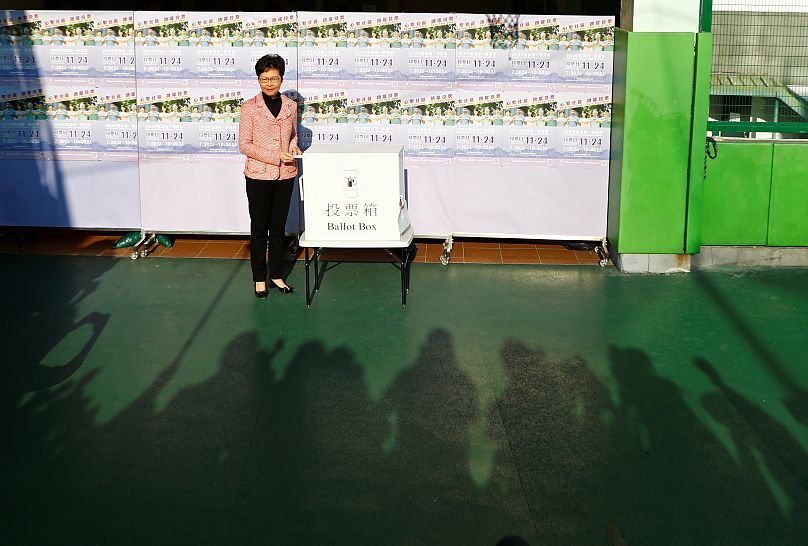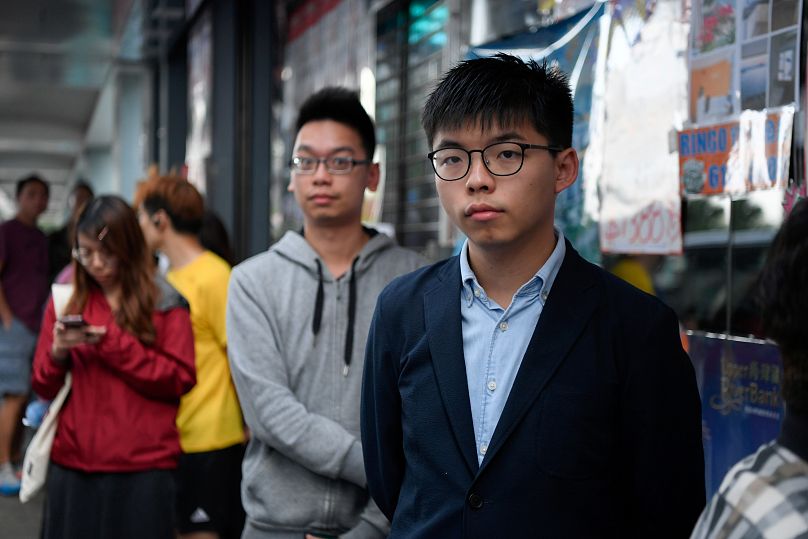Voters sent a clear signal of support for the anti-government protests that have rocked the territory for more than five months.
Pro-democracy candidates have won nearly 90% of the seats in Hong Kong’s local elections, according to returns on Monday, as voters sent a clear signal of support for the anti-government protests that rocked the territory for more than five months.
 ADVERTISEMENT
ADVERTISEMENT
 ADVERTISEMENT
ADVERTISEMENT
A record 71% of the city’s 4.1 million registered voters cast ballots Sunday, well exceeding the 47% turnout in the same election four years ago, election officials said.
The pro-democracy candidates won a total of 390 out of 452 seats in 18 district councils. Previously, the bloc had fewer than a third of the seats.
Among the winners were former student leaders and a candidate who replaced prominent activist Joshua Wong, the only person barred from running in the election. Rally organizer Jimmy Sham, who was beaten by hammer-wielding assailants last month, also triumphed, as did a pro-democracy lawmaker who had part of his ear bitten off by an assailant.
Brutal attacks on election candidates in recent weeks have thrust the lowest tier of government in the Chinese-ruled city into the world spotlight as chief executive Carrie Lam struggles to quash angry demands for universal suffrage.
There was only a small police presence, in contrast to reports that riot police planned to guard all polling stations and almost the entire force of 31,000 would be on duty.
Speaking on Monday, Lam said she hoped peace, security and order could continue across the city, and that the government respected the results of the ballot.
What is a district council poll?
The disctrict councils are the local councils for the 18 districts of Hong Kong. They are under the Government's supervission and their function is mainly advisory. Each term of the district council lasts four years.
The councils take part in matters that affect the well-being of people in their district, such as the use of public facilities and services, the adequacy of Government policies for the area, the management of public funds allocated to the district or the promotion of recreational and environmental activities.
The total number of council members is 479: 452 of them are elected democratically and 27 are ex officio members, part of the Rural Committee that represents indigenous residents in the New Territories of Hong Kong.
This is the first year that all the seats are being contested: a record 1,104 candidates are running for 452 seats and 4.1 million people have enrolled to vote for district, more than half Hong Kong's population of 7.4 million.
As they are considered part of an advisory body, District Council members have little power to take decisions. However, they could have a significant role in the election of Hong Kong's Chief, as the election committe includes 117 council members out of 1,200 seats.
Who is running in this election?
Hong Kong's political spectrum is complex and very diverse, with more than twenty different parties holding seats in the council. They can be broadly divided into pro-Beijing, that currently hold the power in all but one of the councils, and pro-democracy parties, who typically lead the opposition.
The pro-Beijing DAB - Democratic Alliance for the Betterment and Progress of Hong Kong- is the undisputed leader and currently holds 118 seats on the district councils.
The anti-government parties have traditionally been highly fragmented and there is not a main force that could challenge the DAB's leadership.
But after anti-government protests sparked during the last months, young pro-democracy activists are now battling in some seats that were once uncontested and dominated by pro-Beijing candidates. However, they have encountered some opposition from authorities. Joshua Wong, one of the most prominent activists, who was barred from running, urged people to vote to show "our discontent with Beijing".
During the last election in 2015, the pro-establishment Chinese backed parties won with a clear majority of 783,000 votes compared with 540,000 for the anti-government parties. In today's election, pro-democracy candidates are hoping to achieve a better result that could erode Beijing's hegemony.
What did pro-democracy achieve in this election?
The election was considered to be a test of support for China-backed Hong Kong Chief Carrie Lam. The Chief Executive is elected by a 1,200-member election committee, that includes 117 chosen by district councillors. In this system, the winner takes it all: in this case, pro-democracy parties won a majority of votes in the Disctric Council elections and, therefore, they can claim all 117 seats.
The opposition victory in the local election increases their influence over who shall be the city’s next leader in 2022.
After pro-democracy gained control in today's poll, they could secure six of the 70 seats on Hong Kong's Legislative Council.
This body has the power to enact, amend or repeal laws, approve budgets, endorse the appointment or removal of judges of the High Court and start an impeachment process against the Chief Executive.
How do the elections work?
The people of Hong Kong will have to choose their 452 district council members of the 18 city councils. The 600 polling stations opened at 7.30am on Sunday and close at 10.30pm, when the vote counting will start.
All Hong Kong permanent residents aged 18 or older can register to vote (anyone that lives in Hong Kong for more than seven years can become a permanent resident). The deadline for new voters´ registration was on July 2, when protest started into the Legislative Council. More than 386,000 new voters registered this year, which was the biggest annual gain since the early 2000.












